RELG 330 - History of Christianity
Course Notes
![]()
Module 1 - Roman Emperors
Images in the text are linked to larger photos - click on them to see the larger pictures.
Hover the mouse over the images to see their captions and copyright information.
Brief overview of the early Roman Emperors
 Augustus, 31 BC - AD 14, originally called Gaius Octavius (Octavian), was adopted as his heir by his great-uncle Julius Caesar.
Augustus, 31 BC - AD 14, originally called Gaius Octavius (Octavian), was adopted as his heir by his great-uncle Julius Caesar.
Augustus came to power in 31 BC after a conflict with Mark Antony, following the assassination of Julius Caesar in 43 BC
He brought stability to Rome, extended the borders of the Roman Empire, and enforced peace throughout it - which meant that people such as St. Paul and the apostles were able to travel fairly safely to spread Christianity.
Augustus was originally known as Octavian. He was the nephew and adopted heir of Julius Caesar. After the assassination of Julius Caesar and the conflict which followed, in which Mark Antony was killed, Octavian came to power and gave himself the title of Augustus (the August or Revered one). He adopted two step-sons, Tiberius and Drusus. Drusus pre-deceased Augustus, so it was Tiberius who became Emperor when Augustus died in 31 BC
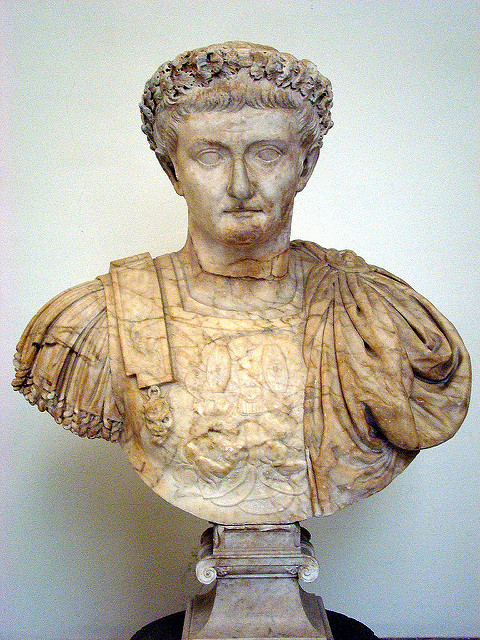 Tiberius (ruled 14-37 AD - hence the Emperor during the adult lifetime of Jesus) and his brother had been prepared and trained for leadership by Augustus. Augustus died at age 73, and the 56-year-old Tiberius became Emperor. Tiberius had been great as a military leader and a general in the Roman army, but after he became Emperor he became more and more paranoid and lecherous. Eventually he left Roma and went to live on the Isle of Capri. He became a terror to everybody, not just to the Christians.
Tiberius (ruled 14-37 AD - hence the Emperor during the adult lifetime of Jesus) and his brother had been prepared and trained for leadership by Augustus. Augustus died at age 73, and the 56-year-old Tiberius became Emperor. Tiberius had been great as a military leader and a general in the Roman army, but after he became Emperor he became more and more paranoid and lecherous. Eventually he left Roma and went to live on the Isle of Capri. He became a terror to everybody, not just to the Christians.
Tiberius had adopted two of his nephews, Germanicus and Drusus, to be his heirs and "sons", but both predeceased him (probably poisoned by rivals). However, Germanicus had a son, Caligula, who was one of the heirs to the Empire, along with a son of Drusus. Caligula was present when Tiberius died, and there were rumors that Caligula had smothered Tiberius with a pillow or poisoned him. Caligula then killed his rival, and became sole Emperor.
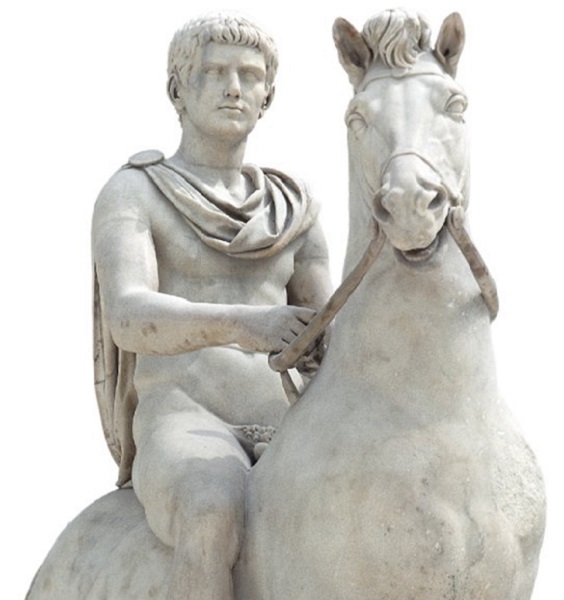 Caligula (ruled AD 37-42) was the great nephew and adoptive grandson of Tiberius. He was 25 when he became Emperor, and for the first few months of his reign he seemed to be a moderate ruler. Then he started to become more and more paranoid, sadistic, and cruel. He was assassinated in AD 42 by members of his own Praetorian Guard. The Praetorian Guard then declared that Caligula's uncle, Claudius, was the next Roman Emperor.
Caligula (ruled AD 37-42) was the great nephew and adoptive grandson of Tiberius. He was 25 when he became Emperor, and for the first few months of his reign he seemed to be a moderate ruler. Then he started to become more and more paranoid, sadistic, and cruel. He was assassinated in AD 42 by members of his own Praetorian Guard. The Praetorian Guard then declared that Caligula's uncle, Claudius, was the next Roman Emperor.
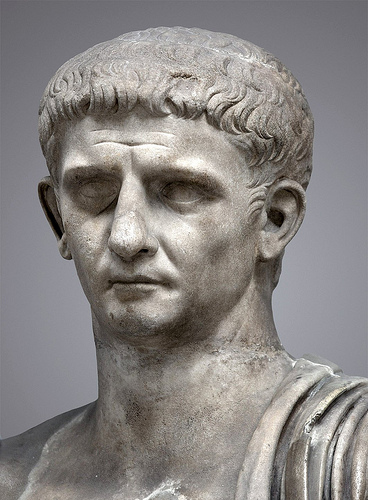 Claudius (born 10 BC, ruled AD 41-54) was a son of Drusus. He was ill as a child, and was lame and deaf as a result. Other writers say that he stammered, his head shook, and when excited he slobbered. As a result, he was excluded from public affairs by his family. His deafness made him seem stupid, although he later turned out to be scholarly and intelligent. His infirmities probably helped to keep him alive during the terrors of Tiberius' and Caligula's reigns - he was not seen as a rival or as of any importance. Claudius turned out to be a capable administrator, and the Empire continued to expand under his leadership. He favored the traditional Roman religion, but seems to have tolerated many other religions, although it is recorded by Suetonius that he expelled the Jews from Rome because they were rioting about someone called "Chrestus" (Christ) - see also Acts 18:2. Claudius made a bad mistake in marrying his fourth wife, Agrippina (who was also his niece) - she poisoned him so that her son Nero could become the next Emperor.
Claudius (born 10 BC, ruled AD 41-54) was a son of Drusus. He was ill as a child, and was lame and deaf as a result. Other writers say that he stammered, his head shook, and when excited he slobbered. As a result, he was excluded from public affairs by his family. His deafness made him seem stupid, although he later turned out to be scholarly and intelligent. His infirmities probably helped to keep him alive during the terrors of Tiberius' and Caligula's reigns - he was not seen as a rival or as of any importance. Claudius turned out to be a capable administrator, and the Empire continued to expand under his leadership. He favored the traditional Roman religion, but seems to have tolerated many other religions, although it is recorded by Suetonius that he expelled the Jews from Rome because they were rioting about someone called "Chrestus" (Christ) - see also Acts 18:2. Claudius made a bad mistake in marrying his fourth wife, Agrippina (who was also his niece) - she poisoned him so that her son Nero could become the next Emperor.
 Nero (born AD 37, ruled AD 54-68) was a terror. He had his own mother assassinated because she was trying to control him. During his reign the Jews rebelled, and the First Jewish Revolt began in AD 66. Nero blamed the Christians for the fire of Rome, though he might have started it himself so as to obtain some land where he wanted to build a palace. In AD 68 Vindex, the Roman governor of Gaul, led a revolt, supported by Galba, governor of Hispania (now Spain). In the ensuing struggle, Vindex was killed, but Rome turned against Nero, and chose Galba as Emperor. Nero fled from Rome and committed suicide when he heard that the Romans had tried him in absentia and condemned him to death. Nero was the last of the dynasty of Julio-Claudian Emperors.
Nero (born AD 37, ruled AD 54-68) was a terror. He had his own mother assassinated because she was trying to control him. During his reign the Jews rebelled, and the First Jewish Revolt began in AD 66. Nero blamed the Christians for the fire of Rome, though he might have started it himself so as to obtain some land where he wanted to build a palace. In AD 68 Vindex, the Roman governor of Gaul, led a revolt, supported by Galba, governor of Hispania (now Spain). In the ensuing struggle, Vindex was killed, but Rome turned against Nero, and chose Galba as Emperor. Nero fled from Rome and committed suicide when he heard that the Romans had tried him in absentia and condemned him to death. Nero was the last of the dynasty of Julio-Claudian Emperors.
Nero's death ushered in a time of civil war known as the Year of the Four Emperors. The stability of the Imperial dynasty was lost - the Roman army had taken on the power of choosing who should be Emperor.
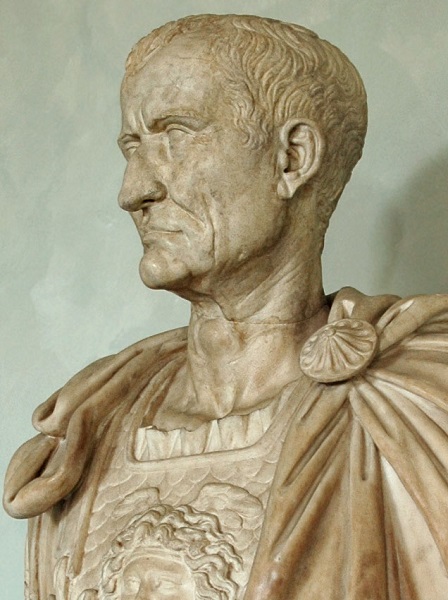 Galba reigned for seven months (June, 68 - January, 69). Galba was 69 when he became Emperor. He had served Claudius loyally, and tried to live in retirement during Nero's reign (a wise choice). However, Nero made Galba governor of Hispania in AD 61, but then in AD 68 decided to kill him. (Nero was insane). Galba found out that Nero was planning to put him to death, and started to march on Rome. The Romans welcomed him and proclaimed him the next Emperor. However, Galba turned out to be mean and cruel, killing people without trial, and becoming increasingly lazy. Within a few months the army rebelled again and proclaimed Vitellius as Emperor. In retaliation, Galba adopted a new heir and potential successor, alienating Otho, one of his close supporters who had expected to become his heir. Otho was governor of Lusitania (Portugal), and had been one of Galba's first supporters. Otho turned against Galba and marched on Rome. Galba led a troop of soldiers against Otho, and was killed.
Galba reigned for seven months (June, 68 - January, 69). Galba was 69 when he became Emperor. He had served Claudius loyally, and tried to live in retirement during Nero's reign (a wise choice). However, Nero made Galba governor of Hispania in AD 61, but then in AD 68 decided to kill him. (Nero was insane). Galba found out that Nero was planning to put him to death, and started to march on Rome. The Romans welcomed him and proclaimed him the next Emperor. However, Galba turned out to be mean and cruel, killing people without trial, and becoming increasingly lazy. Within a few months the army rebelled again and proclaimed Vitellius as Emperor. In retaliation, Galba adopted a new heir and potential successor, alienating Otho, one of his close supporters who had expected to become his heir. Otho was governor of Lusitania (Portugal), and had been one of Galba's first supporters. Otho turned against Galba and marched on Rome. Galba led a troop of soldiers against Otho, and was killed.
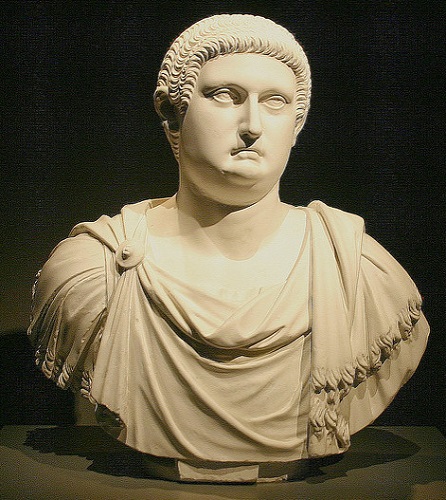 Otho (born 32 AD, reigned 15 January - 16 April, AD 69) had been the husband of Poppaea Sabina, who became the mistress of Nero, divorced Otho, and persuaded Nero to send him into virtual exile as governor of Lusitania in AD 58. (In AD 65 Nero kicked Poppaea to death when she was pregnant). Galba was governor of the adjoining province of Hispania, and the two governors joined in revolt against Nero. Galba was old, and Otho was expecting to become his heir, but when Galba chose someone else Otho started a plot with the Praetorian Guard. They assassinated Galba and his newly-adopted heir, and proclaimed Otho as Emperor. However, the Legions in Germania had proclaimed Vitellius as Emperor, and were marching on Rome. Otho raised what soldiers he could, including the Praetorian Guard, and marched north to meet Vitellius. On April 14 the two armies met at the Battle of Bedriacum - where thousands of Roman soldiers fought other Roman soldiers and killed each other. Otho fled, and killed himself a few days later rather than continue the carnage and plunge Roman into further civil war.
Otho (born 32 AD, reigned 15 January - 16 April, AD 69) had been the husband of Poppaea Sabina, who became the mistress of Nero, divorced Otho, and persuaded Nero to send him into virtual exile as governor of Lusitania in AD 58. (In AD 65 Nero kicked Poppaea to death when she was pregnant). Galba was governor of the adjoining province of Hispania, and the two governors joined in revolt against Nero. Galba was old, and Otho was expecting to become his heir, but when Galba chose someone else Otho started a plot with the Praetorian Guard. They assassinated Galba and his newly-adopted heir, and proclaimed Otho as Emperor. However, the Legions in Germania had proclaimed Vitellius as Emperor, and were marching on Rome. Otho raised what soldiers he could, including the Praetorian Guard, and marched north to meet Vitellius. On April 14 the two armies met at the Battle of Bedriacum - where thousands of Roman soldiers fought other Roman soldiers and killed each other. Otho fled, and killed himself a few days later rather than continue the carnage and plunge Roman into further civil war.
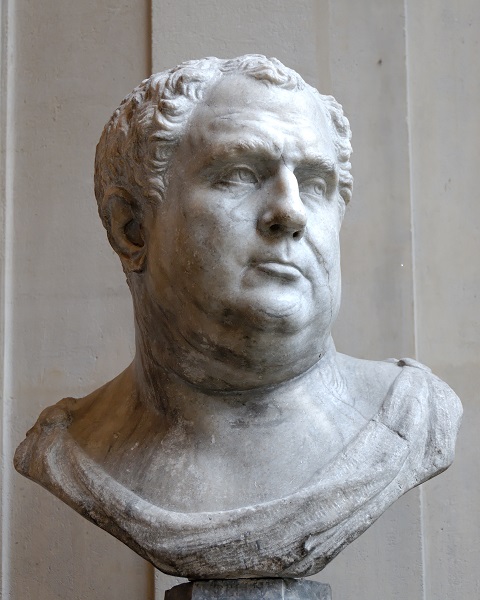 Vitellius (born AD 15, reigned 16 April - 22 December, AD 69) had been appointed governor in Germania by Galba, and probably started plotting a rebellion as soon as he arrived there. He had stayed in Gaul while his soldiers fought Otho, and when Vitellius was Emperor he proved to be lazy, a killer, and a binge-eating glutton. The Roman Legions in the Eastern part of the Empire had had enough, and declared that their general, Vespasian, was Emperor. Vitellius tried to abdicate and flee from Rome, but some of Vespasian's soldiers caught him and executed him.
Vitellius (born AD 15, reigned 16 April - 22 December, AD 69) had been appointed governor in Germania by Galba, and probably started plotting a rebellion as soon as he arrived there. He had stayed in Gaul while his soldiers fought Otho, and when Vitellius was Emperor he proved to be lazy, a killer, and a binge-eating glutton. The Roman Legions in the Eastern part of the Empire had had enough, and declared that their general, Vespasian, was Emperor. Vitellius tried to abdicate and flee from Rome, but some of Vespasian's soldiers caught him and executed him.
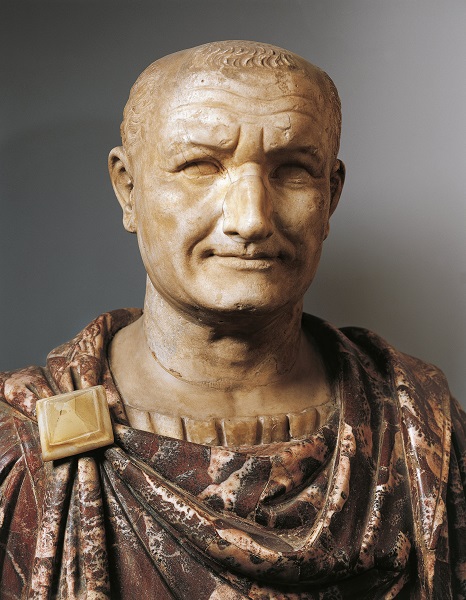 Vespasian (born AD 9, reigned AD 69-79), was founder of the Flavian dynasty. When the First Jewish Revolt broke out in AD 66, the Jews won a number of victories over the Romans until Vespasian was sent out to take command, assisted by his son Titus as second-in-command. He first invaded the Galilee, and, after most of the Jewish forces fled to Jerusalem, was about to march after them when news of the civil war in Rome reached him. The Legions proclaimed Vespasian Emperor, and Vespasian returned to Rome, leaving Titus to march on Jerusalem and start the siege.
Vespasian (born AD 9, reigned AD 69-79), was founder of the Flavian dynasty. When the First Jewish Revolt broke out in AD 66, the Jews won a number of victories over the Romans until Vespasian was sent out to take command, assisted by his son Titus as second-in-command. He first invaded the Galilee, and, after most of the Jewish forces fled to Jerusalem, was about to march after them when news of the civil war in Rome reached him. The Legions proclaimed Vespasian Emperor, and Vespasian returned to Rome, leaving Titus to march on Jerusalem and start the siege.
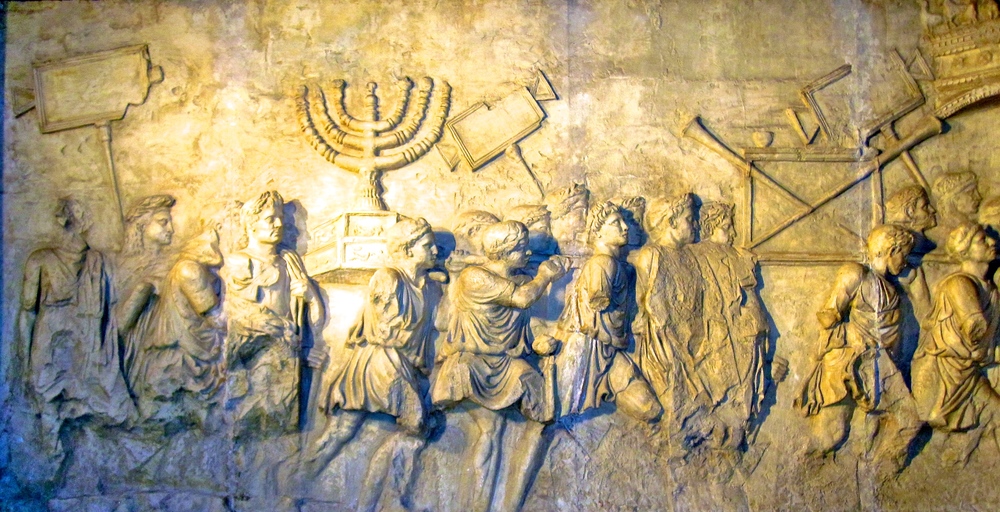 Jerusalem was captured and burned in AD 70. Spoils from the Jerusalem Temple were carried in Triumph through the streets of Rome and are depicted on the "Arch of Titus" in Rome. Vespasian restored peace to Rome, and started to rebuild the city - the Colosseum was built using proceeds from the spoils of the Jerusalem Temple. He also extended the Roman Empire.
Jerusalem was captured and burned in AD 70. Spoils from the Jerusalem Temple were carried in Triumph through the streets of Rome and are depicted on the "Arch of Titus" in Rome. Vespasian restored peace to Rome, and started to rebuild the city - the Colosseum was built using proceeds from the spoils of the Jerusalem Temple. He also extended the Roman Empire.
 Titus (born AD 39, reigned AD 79-81) was the elder son of Vespasian, and became Emperor when Vespasian died. He seems to have been a moderate ruler, but died of a fever after only two years as Emperor.
Titus (born AD 39, reigned AD 79-81) was the elder son of Vespasian, and became Emperor when Vespasian died. He seems to have been a moderate ruler, but died of a fever after only two years as Emperor.
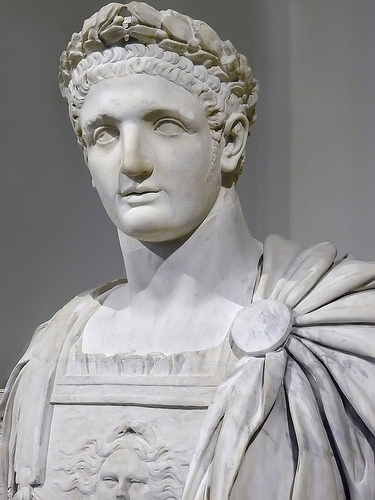 Domitian (born AD 51, reigned AD 81-96) was the younger brother of Titus, and became a ruthless, paranoid dictator. He started to persecute the Christians and was a terror to everyone. He was almost as bad as Nero, and eventually a plot to assassinate him was successful. Cassius Dio claims that even his own wife joined in the plot to assassinate him. The Senate proclaimed Nerva as Emperor the same day that Domitian was assassinated. They probably chose him because he was old, childless, and in poor health - thinking that he would be easy to control, and would not reign long. This was the first time that the Senate elected the Emperor.
Domitian (born AD 51, reigned AD 81-96) was the younger brother of Titus, and became a ruthless, paranoid dictator. He started to persecute the Christians and was a terror to everyone. He was almost as bad as Nero, and eventually a plot to assassinate him was successful. Cassius Dio claims that even his own wife joined in the plot to assassinate him. The Senate proclaimed Nerva as Emperor the same day that Domitian was assassinated. They probably chose him because he was old, childless, and in poor health - thinking that he would be easy to control, and would not reign long. This was the first time that the Senate elected the Emperor.
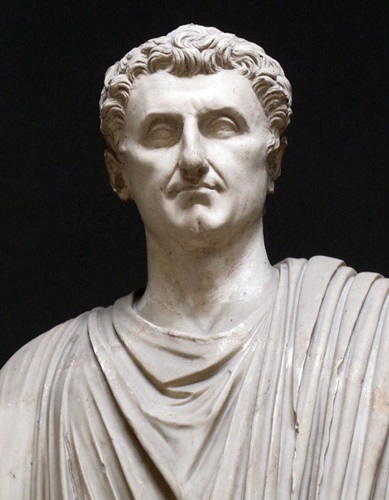 Nerva (born AD 30, reigned AD 96-98) had been an imperial bureaucrat, surviving the reign of Nero, the Year of the Four Emperors, and the reigns of the Flavian dynasty. He was unable to control the Praetorian Guard, and they forced him to choose Trajan as his heir. Nerva died of complications following a stroke.
Nerva (born AD 30, reigned AD 96-98) had been an imperial bureaucrat, surviving the reign of Nero, the Year of the Four Emperors, and the reigns of the Flavian dynasty. He was unable to control the Praetorian Guard, and they forced him to choose Trajan as his heir. Nerva died of complications following a stroke.
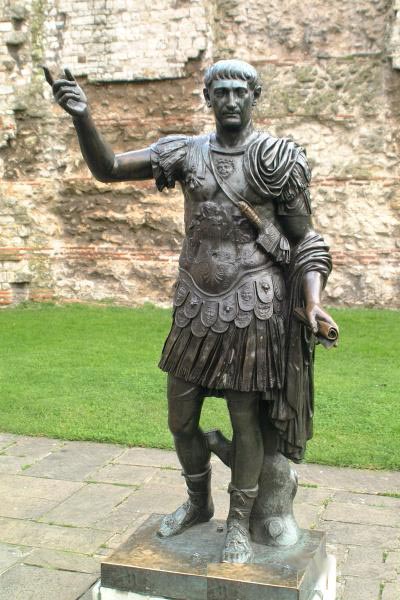 Trajan (born AD 53, reigned AD 98-117) was a soldier as well as an emperor. During his reign the Roman Empire reached its greatest extent. Christianity was considered illegal, and Christians could be tortured and killed just for being Christians, though Trajan does not seem to have instigated any great persecutions against them.
Trajan (born AD 53, reigned AD 98-117) was a soldier as well as an emperor. During his reign the Roman Empire reached its greatest extent. Christianity was considered illegal, and Christians could be tortured and killed just for being Christians, though Trajan does not seem to have instigated any great persecutions against them.
Copyright © 2005 Shirley J. Rollinson, all Rights Reserved